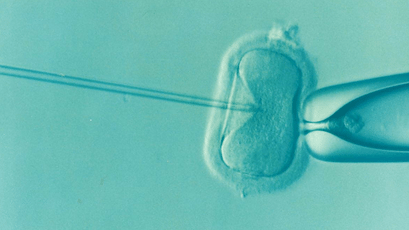
Science, the Law, and Personal Reproductive Responsibility.
Science marches forward. Laws are always reactive. New technologies are embraced by the people. Disagreements arise over unforeseen circumstances. When the people cannot agree on a solution, they end up in court. When the burden of court cases reaches critical mass, legislatures begin drafting bills to clarify individual rights and responsibilities relating to new technology. Today, 1.5% of the babies born in the United States are the result of assisted technology. We’ve come a long way in helping couples who could not have a child to become parents since the first baby was born as the result of IVF nearly forty years ago.

Reproductive technology is currently in the “take disagreements to court” stage which leads to heartbreaking outcomes for some individuals and unexpected financial burdens on nearly everyone involved. Numerous courts have opinioned that they would look first to any contract that exists relating to the embryos, including verbal contracts, in deciding cases related to the disposition of frozen embryos when there is a divorce proceeding. Divorce is difficult enough without having to fight for the lives of your future children.
A well-drafted contract can help you avoid disagreements and the associated heartbreak and expense. Courts are generally upholding agreements made at, or before, the time IVF contracts are signed with a clinic. At that time, the couple’s main focus tends to be on creating a family. They aren’t giving adequate consideration to what will happen if they separate, divorce, or one or both, of them die. While disposition of frozen embryos may be mentioned in clinic’s contracts, it is not the focus of their agreements.

Taking the time to sign a contract before moving ahead with the creation of embryos will help anyone who later experiences a separation, divorce, or the death of their partner.
Contract law is well established. Precedents going back centuries allowing attorneys to draft legal contracts that are enforceable. The basic rules of contract law are that a contract has to:
- Be for or a legal purpose
- Include an offer
- The offer has to be accepted
- Consideration
Each party must give or perform an act that has value to the other, for example:
- Currency, or other valuable consideration
- A promise to perform that you’re not already bound to do.
-
A promise to refrain from an act that you are entitled to do.
- For example, a husband in a State like South Carolina where adultery is illegal promising not to commit adultery is not providing consideration because he is already prohibited from committing adultery.
- Competence to enter into a contract (legal age, right mind)
- Written (when it will take more than a year to complete the contract)
One of the most common objections to a former partner using embryos created with the egg or sperm of a former spouse or lover is the risk that the donor will be held responsible for child support. There are two legal sources we can look to for guidance on drafting agreements that courts are likely to uphold.
Prenuptial Agreements
The law is very clear that child support is a child’s right and that a parent cannot give that right away. This is why prenuptial agreements do not include child support issues.

Uniform Parentage Act of 2017
Although the Uniform Parentage Act of 2017 (UPA) has not been enacted in all states, uniform Acts are drafted by The National Conference of Commissioners on Uniform State Laws (NCCUSL), which provides states with non-partisan, well-conceived and well-drafted legislation that brings clarity and stability to critical areas of state statutory law. States have the ability to:
- Enact uniform laws as is, which seldom happens
- Ignore uniform laws, or
- Enact modified versions of uniform laws
Addressing Parenting Status by Contract
The Uniform Parentage Act provides an alternative to the hands’ off child support issues stance courts take relative to prenuptial agreements, which could overcome the risk of child support being required of a parent who no longer wants a child to be born using his or her genetic material. A contract that includes a clause or clauses similar to one of the following two may be enforceable.

UPA § 706 If a marriage of a woman who gives birth to a child conceived by assisted reproduction ends through divorce or annulment, being declared void, or she is legally separated before the transfer of the embryos to the woman, a former spouse of the woman is not a parent of the child unless the spouse consents to the assisted reproduction after the divorce, annulment, invalidation of the marriage, or legal separation, even if the former spouse’s genetic material was used in forming the embryo.
If a person whose genetic material was used to create an embryo uses a surrogate, or new spouse, to carry a child created by assisted reproduction to term after the person is legally separated from the other person whose genetic material was used to create the embryo, the former spouse of the person is not a parent of the child unless the former (or legally separated) spouse consents to the assisted reproduction after the divorce, annulment, invalidation of the marriage, or legal separation.
To be extra safe, the contract could also include a clause that states:
The status of any party who contributes genetic material to the embryo who withdraws permission before the embryo is transferred to a woman becomes that of a Donor under UPA § 702 defined as:
A donor is not a parent of a child conceived by assisted reproduction. “Donor” means an individual who provides gametes intended for use in assisted reproduction, whether or not for consideration. The Donor may contribute sperm or an egg to the creation of the embryo.
Legal Ownership of the Embryo’s
Many court fights revolve around who gets custody of the embryos. Different states treat embryos differently. Louisiana gives embryos special status as potential humans. Many states consider embryos property. So far, no states give embryos status as children with the right to protection by the courts. It is common to have extra embryos. This is not just an issue that arises when the couple goes their separate ways.
The couple should carefully consider what they want to do with any extra embryos after they use all of the embryo’s they will use.

Unused embryos can be handled in several different ways under current law, although not all states allow all outcomes:
- Implanted in a mother (biological or surrogate) and brought to term.
- Donated to scientific research
- Donated to other couples for implantation
- Cross-donation
- Discard remaining embryos
- Compassionate implantation
The agreement should specify whether the same disposition should be used in different circumstances including:
- The couple divorces, separates, or their marriage is annulled or deemed void
- They become legally separated
- The death of one person
- Both members of the couple die
- The female is infertile and has living children
- The female is infertile and does not have living children
- The male is infertile and has living children
- The male is infertile and does not have living children
Choose a Venue
You may want to carefully consider the venue and specify in the contract which jurisdiction has control of the contract. If you chose a jurisdiction outside your resident state, you will want to make sure there are grounds for using that state. Grounds may include:
- The embryos are created in the chosen state.
- The embryos are stored in the chosen state (Note: relocation of embryos is not recommended)
- Some of the medical procedures or mental health sessions related to IVF were done in the state chosen.
Some states, such as Colorado, have enacted the UPA so that genetic parents may give up their parental rights prior to the time the embryo is implanted in the woman.
What Happens Without a Contract?

When there is no contract to control the disposition of embryos, the courts generally, and often longingly, mention that there isn’t a contract to guide them in the matter. Then the court usually turns to a process where they weigh the balance of the interests of both parties, excluding the interests of the embryo in being born. Iowa used a Contemporaneous Mutual Consent Approach but it failed on appeal. Read about how courts weigh the different interests of the parties and some of their heartbreaking stories in Balancing the Right to Reproduce.
If you are considering using assisted reproductive technology to help you begin a family, make sure you have a contract that addresses the specifics of what will happen if life doesn’t go the way you’ve planned. The contract should comply with the law in your State. The government is unlikely to improve the uncertainty in this area anytime soon. It’s been causing conflicts for more than twenty-five years. Giving embryos status as humans, which would place these battles into Family Law courts as a custody matters, steps in the murky waters of the abortion debates. It would muddy the waters relating to allowing embryos to die, compassionate deaths, and donations to science, which would be on shaky ground. Your contract should include provisions that maintain flexibility to deal with potential changes in state laws.
Another area where the laws aren’t keeping up is State intestate laws. Our ability to procreate is no longer limited by whether we are living. In 2017, a healthy baby was born using an embryo that was frozen for twenty-four years before being implanted. Decisions about whether you want children born after your death to inherit from your estate is another important issue. It must be decided before your death or it becomes too late to include any “after born” children who are born more than ten months after your death.

